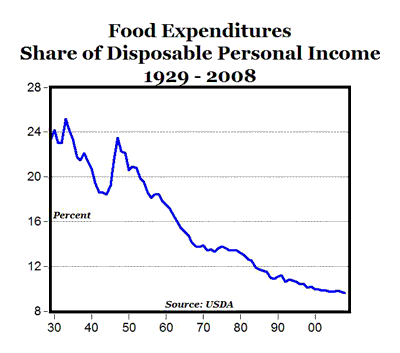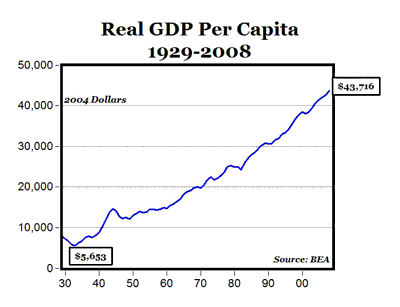
The chart above is based on data from the USDA showing “Food expenditures by families and individuals as a share of disposable personal income,” from 1929 to 2008 (total spending for both “food at home” and “food away from home”).
In the entire history of the U.S., it’s only been in the last eight years that the percent of income spent on food for Americans was in single digits – since 2000 it’s been below 10%. In all previous years, spending on food was in double-digits, and in most years from 1929 to 1952 it was above 20%. Consider that in 1932, spending on food at home took almost 22% of disposable income, compared to the record low of only 5.6% in 2008. Food has never been more affordable than today, as a share of income.
In 2008, despite the “Great Recession,” total spending on food as a share of disposable personal income fell to 9.6%, reaching the lowest level ever recorded in U.S. history. And since spending on food as a share of income is lower in the U.S. than in any other country, the 9.6% share of income spent on food in the U.S. for 2008 is probably the lowest ever in the history of the world.
This amazing trend in lower food prices as a percent of income reflects first of all the relentless and significant improvements in the production and distribution of food over time, and doesn’t even take into account the significant improvements in the quantity and quality of most food products available for today’s Americans compared to previous generations (whole, 2% 1%, 1/2%, and skim milk are available for today consumers vs. whole milk only in the past as just one example).
And second of all, Americans are more than 7.7 times wealthier today compared to 1933 based on per-capita real GDP in constant 2004 dollars ($5,653 in 1933 vs. $43,716 in 2008), see chart below. With higher real incomes and lower food prices, it’s not surprising that spending on food as a share of income is at an all-time low. And it also makes the comparisons of today’s economic conditions and our current standard of living to the conditions during the Great Depression pretty silly, doesn’t it?

- Bulenox: Get 45% to 91% OFF ... Use Discount Code: UNO
- Risk Our Money Not Yours | Get 50% to 90% OFF ... Use Discount Code: MMBVBKSM
Disclaimer: This page contains affiliate links. If you choose to make a purchase after clicking a link, we may receive a commission at no additional cost to you. Thank you for your support!


Leave a Reply